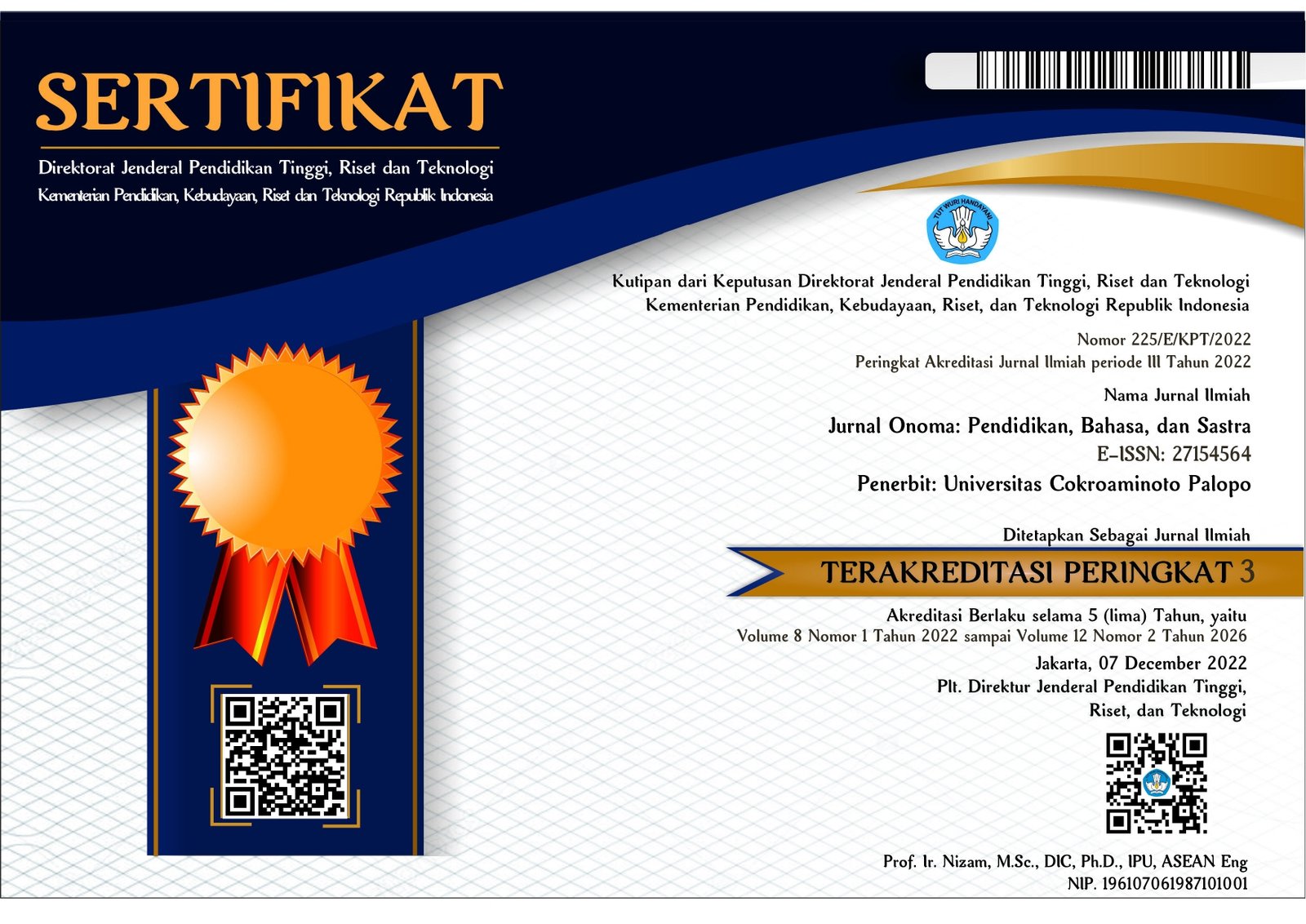Developing Students’ Speaking Skill through Small Group Discussion (SGD) Technique
https://doi.org/10.30605/onoma.v9i2.2895
Keywords:
speaking skill, Small Group Discussion, experimentalAbstract
The purpose of this research is to find out whether or not the use of Small Group Discussion (SGD) technique can develop speaking skill to the tenth grade students of SMA Negeri 1 Bolano Parigi Moutong District. This research used a quasi-experimental research design with 77 students as a sample selected by using the cluster sampling technique. Additionally, the data of this research was obtained through a test which was divided into pre-test and post-test. The mean pre-test score for the experimental group and the control group were 48.90 and 55.77. The mean post-test score for the experimental group and the control group were 73.90 and 60.04. The data was theoretically analyzed by applying the t-test formula where the degree of freedom (df) is 75. The result of statistical analysis shows that the t-test value is 3.19 while the t-table value is 1.99. The result of the research findings shows that the t-test value is higher than the t-table value. It implies that the research hypothesis is accepted. It means that the use of Small Group Discussion (SGD) technique can develop speaking skill to the tenth grade students of SMA Negeri 1 Bolano Parigi Moutong District.
Downloads
References
Al Jawad, A. S. H., & Abosnan, S. H. (2020). The Impact of Using Small Group Discussion Technique on Enhancing Students’ Performance in Speaking Skill: A Case Study of Benghazi University. International Journal of Linguistics, Literature and Translation, 3(7), 189-198. DOI: 10.32996/ijllt www.ijllt.org
Antoni, R. (2014). Teaching Speaking Skill through Small Group Discussion Technique at the Accounting Study Program. Journal of Education and Islamic Studies, (online), 5(1), 55-64 (retrieved March 15, 2017, from http://ejournal.uin-suska.ac.id/).
Argawati, N. (2014). Improving Students’ Speaking Skill Using Group Discussion. Surakarta: ELTIN Journal.
Arikunto, Suharsimi. (2014). Prosedur Penelitian Suatu Pendekatan Praktik. Jakarta: Rineka Cipta.
Baker, Carry L. (2009). Discussion and Group Work Method in Language Learning. New Jersey: Harper and Row Publisher, Inc.
Bhatti, Aisha, Sarimah Shamsudin, and Seriaznita Binti Mat Said. (2018). “Code-Switching: A Useful Foreign Language Teaching Tool in EFL Classrooms.” English Language Teaching 11, no. 6 (May 14, 2018): 93. https://doi.org/10.5539/elt.v11n6p93
Bohari, L. (2020). Improving speaking skills through small group discussion at eleventh grade students of SMA Plus Munirul Arifin NW Praya. Journal of Languages and Language Teaching, 7(1), 68-81.
Brown, H.D. (2001). Teaching by Principles: An Interactive Approach to Language Pedagogy. New York: Addison Wesley Longman Inc.
Brown, George and Madeleine Atkins. (1988). Effective Teaching in Higher Education. London and New York: Methuen & Co, Ltd.
Cahya, P. (2017). The Correlation between Students’ L2 Motivation and Their EFL Proficiency. Ethical Lingua: Journal of Language Teaching and Literature, 4(2), 176183. https://doi.org/10.30605/ethicallingua.v4i2.633
Creswell, J. W. (2008). Educational Research: Planning, Conducting, and Evaluating Quantitative and Qualitative Research, New Jersey: Pearson Education Ltd
Depdiknas. 2006. Pembelajaran Bahasa Inggris. Jakarta: Badan Standar Nasional Pendidikan.
Gay, L.R. (1981). Educational Research; Competencies for Analysis and Applications. Columbus: Charcks, E. Merril Publishing Co.
Gay, L.R., Mills, G.E. and Airasian, P. (2012). Educational Research: Competencies for Analysis and Applications. (tenth ed.). New Jersey: Pearson Education, Inc.
Harmer, J. (2001). The Practice of English Language Teaching: Third Edition. England: Longman, p. 269-271.
Hughes, A. (2003). Testing for language teachers. Cambridge: Cambridge University Press.
Kindsvatter, R., Wilen, W., & Ishler, M. (1996). Dynamics of effective teaching (3rd Ed.) New York: Longman.
Layman. (1972). Technique in Testing. New York: Oxford University Press.
Lien, C. (2021). Implementing Group Work in Teaching Speaking Skill for EFL Learners. International Journal of Research in Engineering, Science and Management, 4(6), 1-4.
Liu, M. (2018). Interactive effects of English-speaking anxiety and strategy use on oral English test performance of high- and low-proficient Chinese university EFL learners. Cogent Education, 5(1), 1– 14. https://doi.org/10.1080/2331186X.2018.1562410
Mart, C.T. (2012). Developing Speaking Skill trough Reading. International Journal of English Linguistics, (Online), 2(6):91- 96. http://dx.doi.org/10.5539/ijel.v2n6p91
Riasati, M. J. (2018). Willingness to speak English among foreign language learners: A causal model. Cogent Education, 5(1), 1–17. https://doi.org/10.1080/2331186X.2018.1455332
Susanti, Lina., Mustofa, Mutmainnah., & Zahroh, Fatimatus. (2021). Improving English Speaking Skills through Small Group Discussion. Journal of English for Academic and Specific Purposes, 4(2), (243– 253).
Thayyib, M. (2019). The Betterment of Group Dynamics in Theory of Translation Class through Lesson Study. Ethical Lingua: Journal of Language Teaching and Literature, 6(2), 86-97. https://doi.org/10.30605/25409190.v6.86-97
Downloads
Published
How to Cite
License
In submitting the manuscript to the journal, the authors certify that:
- They are authorized by their co-authors to enter into these arrangements.
- The work described has not been formally published before, except in the form of an abstract or as part of a published lecture, review, thesis, or overlay journal.
- That it is not under consideration for publication elsewhere,
- That its publication has been approved by all the author(s) and by the responsible authorities – tacitly or explicitly – of the institutes where the work has been carried out.
- They secure the right to reproduce any material that has already been published or copyrighted elsewhere.
- They agree to the following license and copyright agreement.
License and Copyright Agreement
Authors who publish with Onoma Journal: Education, Languages??, and Literature agree to the following terms:
- Authors retain copyright and grant the journal right of first publication with the work simultaneously licensed under Creative Commons Attribution License (CC BY 4.0) that allows others to share the work with an acknowledgment of the work's authorship and initial publication in this journal.
- Authors are able to enter into separate, additional contractual arrangements for the non-exclusive distribution of the journal's published version of the work (e.g., post it to an institutional repository or publish it in a book), with an acknowledgment of its initial publication in this journal.
- Authors are permitted and encouraged to post their work online (e.g., in institutional repositories or on their website) prior to and during the submission process, as it can lead to productive exchanges, as well as earlier and greater citation of published work.

















